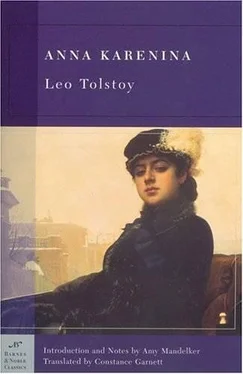Leo Tolstoy - Anna Karenina
Здесь есть возможность читать онлайн «Leo Tolstoy - Anna Karenina» весь текст электронной книги совершенно бесплатно (целиком полную версию без сокращений). В некоторых случаях можно слушать аудио, скачать через торрент в формате fb2 и присутствует краткое содержание. Жанр: Классическая проза, на английском языке. Описание произведения, (предисловие) а так же отзывы посетителей доступны на портале библиотеки ЛибКат.
- Название:Anna Karenina
- Автор:
- Жанр:
- Год:неизвестен
- ISBN:нет данных
- Рейтинг книги:4 / 5. Голосов: 1
-
Избранное:Добавить в избранное
- Отзывы:
-
Ваша оценка:
- 80
- 1
- 2
- 3
- 4
- 5
Anna Karenina: краткое содержание, описание и аннотация
Предлагаем к чтению аннотацию, описание, краткое содержание или предисловие (зависит от того, что написал сам автор книги «Anna Karenina»). Если вы не нашли необходимую информацию о книге — напишите в комментариях, мы постараемся отыскать её.
Anna Karenina — читать онлайн бесплатно полную книгу (весь текст) целиком
Ниже представлен текст книги, разбитый по страницам. Система сохранения места последней прочитанной страницы, позволяет с удобством читать онлайн бесплатно книгу «Anna Karenina», без необходимости каждый раз заново искать на чём Вы остановились. Поставьте закладку, и сможете в любой момент перейти на страницу, на которой закончили чтение.
Интервал:
Закладка:
"It's very well for you to talk like that; it's very much like that gentleman in Dickens who used to fling all difficult questions over his right shoulder with his left hand. But denying the facts is no answer. What's to be done- you tell me that; what's to be done? Your wife gets older, while you're full of life. Before you've time to look round, you feel that you can't love your wife with love, however much you may esteem her. And then all at once love turns up- and you're done for; you're done for," Stepan Arkadyevich said with weary despair.
Levin smiled slightly.
"Yes, you're done for," resumed Oblonsky. "But what's to be done?"
"Don't steal loaves."
Stepan Arkadyevich laughed outright.
"Oh, moralist! But you must understand, there are two women; one insists only on her rights, and those rights are your love, which you can't give her; while the other sacrifices everything for you and asks for nothing. What are you to do? How are you to act? There's a fearful tragedy in it."
"If you care for my profession of faith as regards that, I'll tell you that I don't believe there was any tragedy about it. And this is why. To my mind, love… both sorts of love, which you remember Plato defines in his Banquet, serve as the touchstone of men. Some men only understand one sort, and some only the other. And those who only know the nonplatonic love talk in vain of tragedy. In such love there can be no sort of tragedy. 'I'm much obliged for the gratification, my humble respects,'- that's all the tragedy. And in platonic love there can be no tragedy, because in that love all is clear and pure, because…"
At that instant Levin recollected his own sins and the inner conflict he had lived through. And he added unexpectedly:
"But perhaps you are right. Very likely… I don't know- I positively don't know."
"You see," said Stepan Arkadyevich, "you're very much all of a piece. That's your quality and your failing. You have a character that's all of a piece, and you want the whole of life to be of a piece too- but that's not how it is. You despise public official work because you want the reality to be constantly corresponding with the aim- and that's not how it is. You want a man's work, too, always to have a defined aim, and love and family life always to be undivided- and that's not how it is. All the variety, all the charm, all the beauty of life is made up of light and shadow."
Levin sighed and made no reply. He was thinking of his own affairs, and was not listening to Oblonsky.
And suddenly both of them felt that though they were friends, though they had been dining together, and drunk wine which should have drawn them closer, yet each was thinking only of his own affairs, and they had nothing to do with one another. Oblonsky had more than once experienced this extreme sense of aloofness, instead of intimacy, coming on after dinner, and he knew what to do in such cases.
"Let's have the check!" he called, and he went into the next room, where he promptly came across an aide-de-camp of his acquaintance and dropped into conversation with him about an actress and her protector. And at once, in this conversation with the aide-de-camp, Oblonsky had a sense of relaxation and relief after his conversation with Levin, which always put him to too great a mental and spiritual strain.
When the Tatar appeared with a check of twenty-six roubles and some kopecks, besides a tip for himself, Levin, who would another time have been horrified, like anyone from the country, at his share of fourteen roubles, did not notice it, paid, and set off homeward to dress and go to the Shcherbatskys', where his fate was to be decided.
XII
The young princess Kitty Shcherbatskaia was eighteen. It was the first winter that she had been out in the world. Her success in society had been greater than that of either of her elder sisters, and greater even than her mother had anticipated. To say nothing of the young men who danced at the Moscow balls being almost all in love with Kitty, two serious suitors had already, the first winter, made their appearance: Levin, and, immediately after his departure, Count Vronsky.
Levin's appearance at the beginning of the winter, his frequent visits, and evident love for Kitty, had led to the first serious conversations between Kitty's parents as to her future, and to disputes between them. The Prince was on Levin's side; he said he wished for nothing better for Kitty. The Princess for her part, going round the question in the manner peculiar to women, maintained that Kitty was too young, that Levin had done nothing to prove that he had serious intentions, that Kitty felt no great attraction to him, and there were some other reasons too; but she did not state the principal point, which was that she looked for a better match for her daughter, that Levin was not to her liking, and that she did not understand him. When Levin had abruptly departed, the Princess was delighted, and said to her husband triumphantly: 'You see, I was right.' When Vronsky appeared on the scene, she was still more delighted, confirmed in her opinion that Kitty was to make not simply a good, but a brilliant match.
In the mother's eyes there could be no comparison between Vronsky and Levin. The mother disliked in Levin his strange and uncompromising opinions and his shyness in society, founded on his pride, as she supposed, and his queer sort of life, as she considered it, absorbed in cattle and peasants. She did not very much like it that he, who was in love with her daughter, had kept coming to the house for six weeks, as though he were waiting for something, inspecting, as though he were afraid he might be doing them too great an honor by making a proposal, and did not realize that a man who continually visits at a house where there is a young unmarried girl, is bound to make his intentions clear. And suddenly, without doing so, he disappeared. "It's as well he's not attractive enough for Kitty to have fallen in love with him," thought the mother.
Vronsky satisfied all the mother's desires. Very wealthy, clever, of aristocratic family, on the highroad to a brilliant career in the army and at court, and a fascinating man. Nothing better could be wished for.
Vronsky openly flirted with Kitty at balls, danced with her, and came continually to the house; consequently there could be no doubt of the seriousness of his intentions. But, in spite of that, the mother had spent the whole of that winter in a state of terrible anxiety and agitation.
Princess Shcherbatskaia had herself been married thirty years ago, her aunt arranging the match. The wooer, about whom everything was well known beforehand, had come, looked at his intended, and been looked at. The matchmaking aunt had ascertained and communicated their mutual impression. That impression had been favorable. Afterward, on a day fixed beforehand, the expected proposal was made to her parents, and accepted. All had passed very simply and easily. So it seemed, at least, to the Princess. But over her own daughters she had felt how far from simple and easy is the business, apparently so commonplace, of marrying off one's daughters. The panics that had been lived through, the thoughts that had been brooded over, the money that had been wasted, and the disputes with her husband over marrying the two elder girls, Darya and Natalya! Now, since the youngest began to come out in the world, the Princess was going through the same terrors, the same doubts, and still more violent quarrels with her husband, than she had over the elder girls. The old Prince, like all fathers indeed, was exceedingly scrupulous on the score of the honor and reputation of his daughters; he was unreasonably jealous over his daughters, especially over Kitty, who was his favorite, and at every turn he had scenes with the Princess for compromising her daughter. The Princess had grown accustomed to this already with her other daughters, but now she felt that there was more ground for the Prince's scrupulousness. She saw that of late years much was changed in the manners of society, that a mother's duties had become still more difficult. She saw that girls of Kitty's age formed some sort of clubs, went to some sort of lectures, mixed freely in men's society, drove about the streets alone; many of them did not curtsy; and, what was the most important thing, all of them were firmly convinced that to choose their husband was their own affair, and not their parents'. "Marriages aren't made nowadays as they used to be," was thought and said by all these young girls, and even by their elders. But just how marriages were made nowadays, the Princess could not learn from anyone. The French fashion- of the parents arranging their children's future- was not accepted; it was condemned. The English fashion of the complete independence of girls was also not accepted, and not possible in Russian society. The Russian fashion of matchmaking was considered unseemly; it was ridiculed by everyone- even by the Princess herself. But how girls were to be married, and how parents were to marry them, no one knew. Everyone with whom the Princess had chanced to discuss the matter said the same thing: "Mercy on us, it's high time in our day to cast off all that old-fashioned business. It's the young people have to marry, and not their parents; and so we ought to leave the young people to arrange it as they choose." It was very easy for anyone to say who had no daughters, but the Princess realized that, in the process of getting to know each other, her daughter might fall in love, and fall in love with someone who did not care to marry her, or who was quite unfit to be her husband. And, however much it was instilled into the Princess that in our times young people ought to arrange their lives for themselves, she was unable to believe it, just as she would have been unable to believe that, at any time whatever, loaded pistols were the most suitable playthings for children five years old. And so the Princess was more uneasy over Kitty than she had been over the elder daughters.
Читать дальшеИнтервал:
Закладка:
Похожие книги на «Anna Karenina»
Представляем Вашему вниманию похожие книги на «Anna Karenina» списком для выбора. Мы отобрали схожую по названию и смыслу литературу в надежде предоставить читателям больше вариантов отыскать новые, интересные, ещё непрочитанные произведения.
Обсуждение, отзывы о книге «Anna Karenina» и просто собственные мнения читателей. Оставьте ваши комментарии, напишите, что Вы думаете о произведении, его смысле или главных героях. Укажите что конкретно понравилось, а что нет, и почему Вы так считаете.












